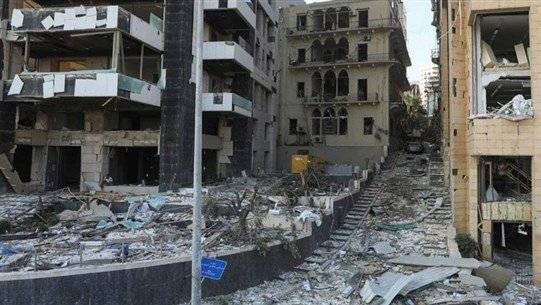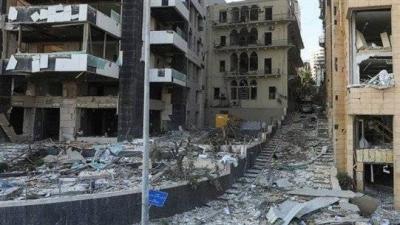Two years since the Beirut explosion. An explosion can occur by accident, while a detonation is intentional. Beirut was detonated. One hundred buildings were completely demolished. Three hundred heritage homes were damaged. Many houses have been superficially repaired, but in essence, they remain at risk, with many more waiting for our "officials" to let them collapse on their inhabitants! Beirut – the mother of cities – resembles a nuclear bomb site two years after an explosion reminiscent of a nuclear blast, with what remains of the true Beirut becoming a project for new victims.
Many have exploited Beirut. Many treated it as one would treat a fleeting desire, a pleasure, a mere aim, indifferent to the fate into which it was cast, becoming, once the eyes were fixated on it, weak, disappointed, and fearful. Beirut has become a victim. Time has passed. Here we are again, recalling what we have not forgotten and never will: August 4, 2020. Now we count the days after August 4 and before it. We count the days while they are counting the money that belongs to us, dividing it as if it were theirs, to inject the remnants of the state’s structure with additional days. And some count the victims of Beirut, recalling only a few names, while forgetting the rest. To many, victims are just numbers, corpses, and remains without names, faces, laughter, or dreams. Is this their destiny? Is it our fate to be born here, to grow up here, and to allow them, every time, to sacrifice us? Yes. Beirut, which was assassinated two years ago in every sense of the word, continues today in a state of death.
So what are the details? Do you remember the day brokers roamed and asked those who had not yet wiped the blood from their garments: Do you want to sell your homes? Homes, like nations, signify existence. Some sold, some did not. Those who did not sell today live in "unstable" properties at risk. The state is indifferent. It does not care. The Beirut municipality is powerless. And the homeowners themselves are at a loss. How can a property owner receiving less than two million Lebanese pounds annually for their property restore it with fresh dollars? In Beirut alone, according to Andira Al-Zuhairi, president of the Lebanese Real Estate Association, there are 13,158 old rented housing units. Across Lebanon, there are 64,926 old rented housing units. No, we will not open the file of old rents today, but we ask the state and its constituents: Do you care about the crumbling houses due to the Beirut explosion, and about those who live in them? No, we will not wait for a response from a state in a coma that will say when houses collapse on their residents: I did not know!
In any case, for those concerned, 85,744 units were completely or partially damaged in Beirut after the port explosion, specifically in Ashrafieh, Gemmayzeh, Jaitawi, Shahrour, Saifi, and other neighborhoods, including 60,818 residential units and 20,171 educational institutions, companies, hospitals, and restaurants... and also 1,173 heritage buildings.
What does Andira Al-Zuhairi, the social human rights activist concerned with building safety, have to add? She replies, "Many real estate companies attempted to exploit Beirut and the areas that were damaged in Beirut, especially since the majority of that space is made up of old owners who found themselves more unable than ever to restore their buildings and homes. These real estate companies rushed to provide 'aid,' purely for personal profit, purchasing properties at low prices from people who have come to accept anything, anything that might remove them from a hijacked capital. The city has entered a phase that is now between severe stagnation and slow growth, where the wealthy can buy cheaply, and the poor, in pain, sell for pennies. It is a capital surviving on artificial oxygen. It is in a coma. It is in a deep sleep like the sleeping beauty in tales and stories."
In this ugly swamp, the question arises: What about the safety of many Beirut buildings today? Al-Zuhairi responds: "You will notice in the near to medium-term an increase in the number of time bombs in the capital, with before August 4, 2020, more than 1,046 buildings at risk of collapse. After the explosion, and according to a partial survey, it was found that there are 86,000 affected residential and non-residential units. We all know the rising prices of essential materials needed for reinforcement and restoration, prompting many to use expired materials for that purpose, amidst the draining of most of the aid that arrived for this in dubious ways. The survey conducted was partial, and concrete loses five percent of its quality annually, so how about if these are very old buildings that suffered due to the war and were 'unstable' from a massive explosion? All this amid extremely difficult economic and financial conditions today and very high costs for raw materials."
No accurate or even approximate statistics are currently available on the number of sales that have taken place in Beirut. "But the general situation, according to Al-Zuhairi, gives an impression that the percentage may be high. The city dweller needs to sell to survive or to travel and spend what remains of their lives securely, or to obtain some liquidity, some modest amount, and survive. Need has driven citizens to sell haphazardly in the presence of those who rushed to exploit them deceitfully in the absence of oversight and awareness and the impossibility of enduring."
The president of the Lebanese Real Estate Association swiftly contacted the Lebanese Army to provide awareness assistance "to protect people's and owners' rights by lifting the responsibility from them regarding any collapse of buildings that are at risk," adding, "There are large associations that exploited the aid and conducted shoddy repairs, building new walls that crumble easily and quickly, randomly and without study, and are not safe for residents."
Beirut, as Al-Zuhairi sees it, is "hijacked, marginalized, displacing three-quarters of its people, and many homes are unstable; the sea air harms its structures, and water seeps into its foundations, facing impending disasters. It is like nuclear bombs, and the many generators between its tightly packed houses are damaging it even more. Sixteen thousand buildings (comprising 86,000 residential and non-residential units), according to official statistics, could collapse at any moment. Are they waiting for them to fall to act? And will regret be of any benefit? The municipality's role here is evacuation, even through security forces; the municipality is the miniature state. Old property owners today are demanding that the Parliament pass a bill protecting them from the responsibilities of their buildings collapsing on those inside. They are demanding that the responsibility be lifted from them while they see the repercussions of cracks with the naked eye."
Everyone wants to evade responsibility, and the remaining few people remain potential corpses and new victims. So, who will consider them, or will anyone consider them, as we live through the second anniversary of the Beirut explosion?




